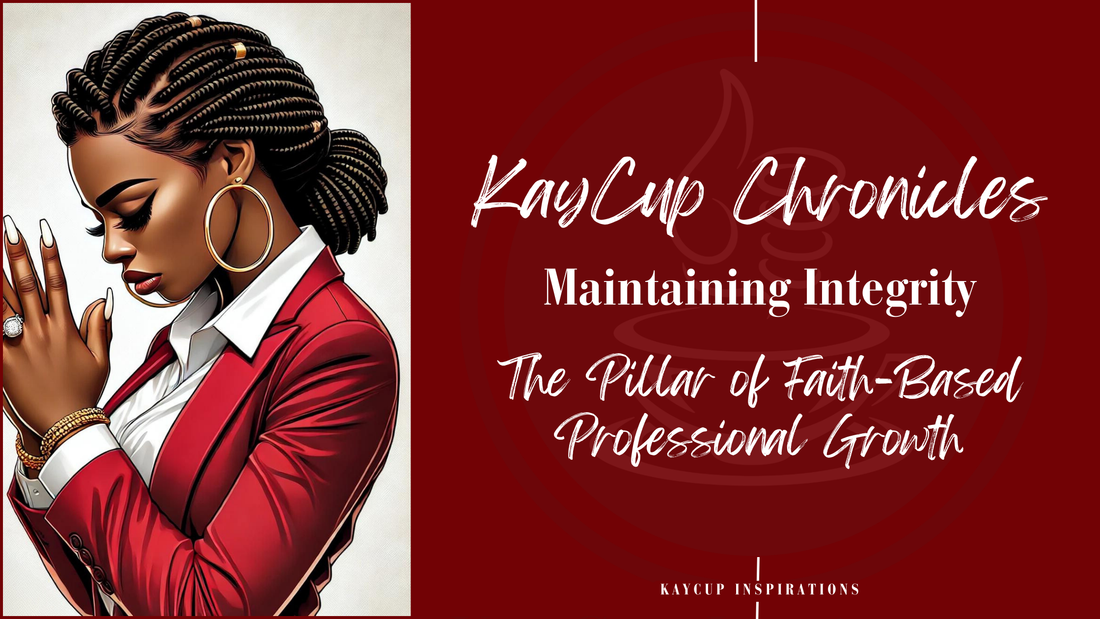
Maintaining Integrity: The Pillar of Faith-Based Professional Growth
Share
In the business world, integrity is the backbone of faith-based professional growth. This term refers to integrating your faith and values into your professional life and using them to guide your career decisions and actions. For women in business, maintaining integrity means consistently aligning your actions with your values, regardless of circumstances. It's about building trust, credibility, and a solid reputation that reflects your commitment to ethical principles. In the context of faith, integrity is not just about doing the right thing but about doing it for the right reasons, guided by your beliefs and values. This alignment not only empowers you but also gives you the confidence and capability to navigate any professional situation with grace and integrity.
Understanding Integrity
Integrity is about doing the right thing and finding security in your actions, even when no one is watching. It's about honesty, transparency, and a commitment to ethical behavior. Proverbs 10:9, a scripture that teaches us about the benefits of integrity, says, 'Whoever walks in integrity walks securely, but whoever takes crooked paths will be found out.' This scripture underscores the importance of maintaining integrity in all aspects of life, including your professional journey, and the sense of security it brings.
Being Honest and Transparent
Honesty and transparency are crucial in fostering trust within your team and with your clients. For instance, if you make a mistake in a project, be honest about it and take steps to rectify the situation. This could mean admitting the error to your team, discussing the steps you're taking to fix it, and ensuring it doesn't happen again. Transparency builds a culture of trust and respect, which is essential for long-term success. It also helps you build stronger relationships with your team and clients, which can lead to more opportunities and personal fulfillment.
Setting Clear Boundaries
Establishing clear boundaries is vital to maintaining integrity. Define what you are willing to do to pursue success and ensure your actions do not compromise your values. Clear boundaries help you stay true to your faith and bring peace and purpose to your work.
Holding Yourself Accountable
Accountability is a crucial aspect of integrity. Take responsibility for your actions and decisions. When you make a mistake, own up to it and take steps to rectify the situation. This accountability fosters trust and shows your commitment to maintaining high ethical standards. It also helps you learn from your mistakes and grow professionally, which can lead to personal fulfillment and career advancement.
Leading by Example
As a leader, your behavior and decisions extensively influence the atmosphere within your team. Model integrity in all aspects of your professional life. Your behavior should reflect the values and principles you expect from others. For instance, if you wish your team to be punctual, ensure you're always on time for meetings. 1 Timothy 4:12 encourages us to be a positive example for others in speaking, behaving, showing love, demonstrating faith, and maintaining purity. This scripture reminds us that our actions speak louder than words, and by living our faith in our professional lives, we can inspire others to do the same.
Practical Tips for Maintaining Integrity
- Develop a Personal Code of Ethics: Outline your core values and ethical principles. When faced with difficult decisions, refer to this code to ensure your actions align with your beliefs.
- Seek Accountability Partners: Find trusted individuals within your faith community who can help keep you accountable. Regular check-ins with these partners can provide support and guidance.
- Reflect Regularly: Take time to reflect on your actions and decisions. Ask yourself if they align with your values and faith. Reflection helps you stay grounded and focused on maintaining integrity.
- Stay Informed: Stay updated on your industry's ethical standards and best practices. This knowledge enables you to navigate complex situations with confidence and integrity.
Maintaining integrity is a moral obligation to build trust, credibility, and a fulfilling professional life. It's about staying true to your values and aligning your actions with your faith. As you continue to grow in your career, remember that integrity is not just about what you achieve but how you achieve it. When you maintain integrity, you build a reputation for being trustworthy and reliable, which can open doors to new opportunities and collaborations. We encourage you to put the practical tips in this article into action and share your experiences with us and your peers. Together, we can continue to grow in our faith-based professional journeys.
Share your thoughts and experiences in the comments below, or join our community forum to connect with other women in business who are integrating their faith and values into their professional lives.
Stay tuned for our next post, where we'll discuss incorporating prayer into your daily routine and how it can provide guidance and strength in your professional life.
